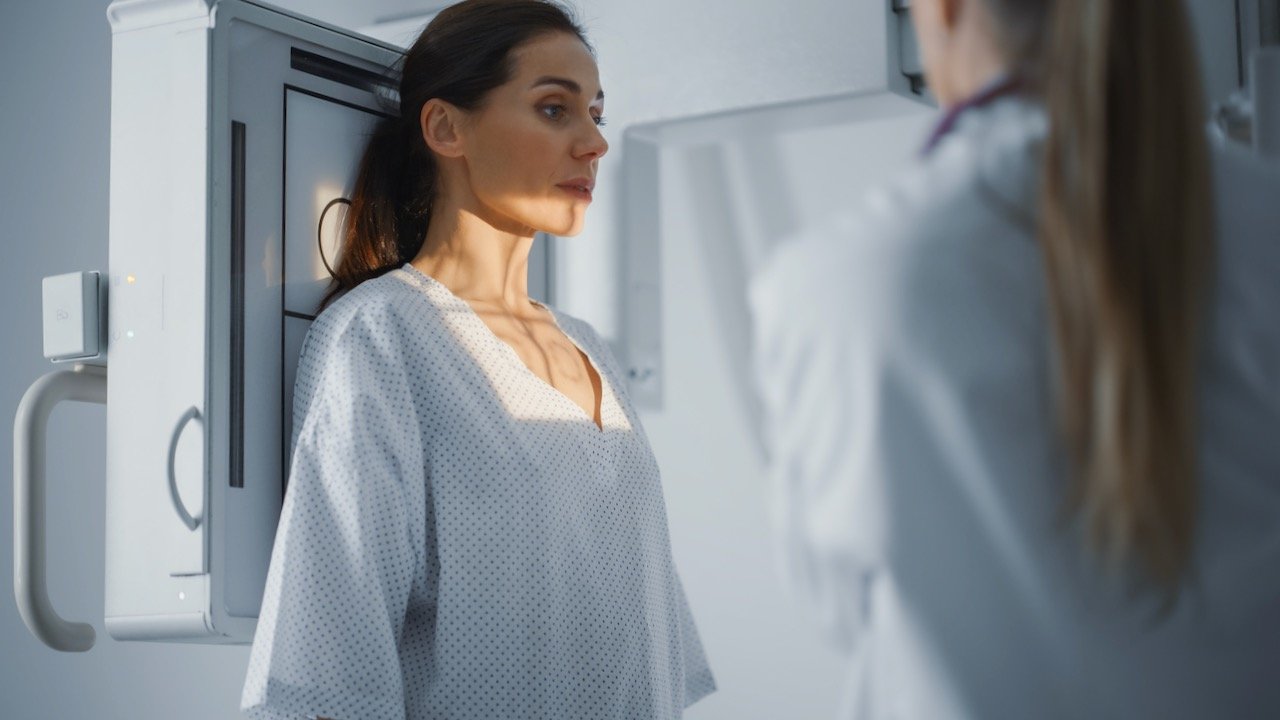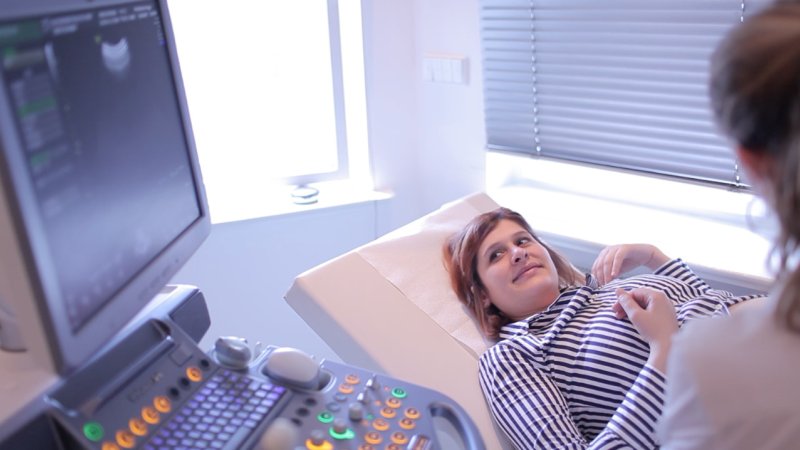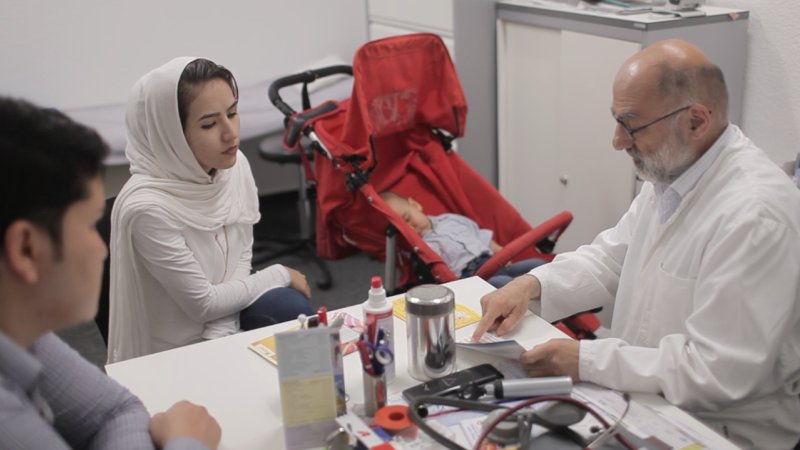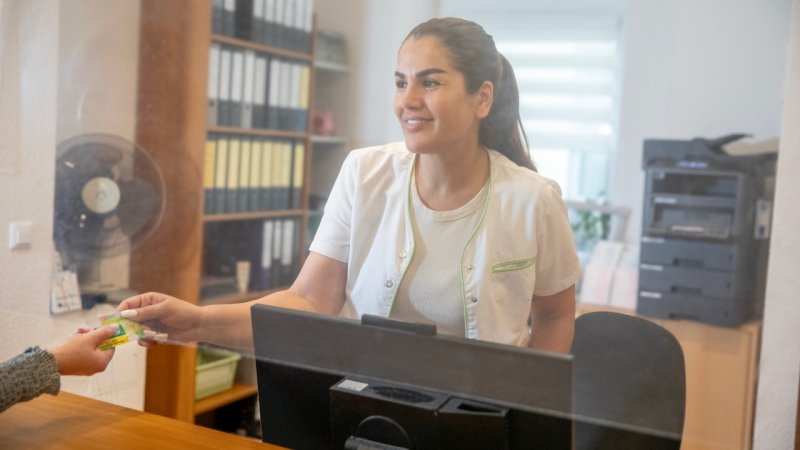
Approximately half a million people in Germany are diagnosed with cancer every year. Some types of cancer, such as breast or cervical cancer, are, in fact, usually curable - but only if detected in time. Free health checks are intended to ensure any problem can be detected early on so that doctors can identify diseases as early as possible to prevent them from becoming severe or possibly fatal.
A preventive or early detection examination ("screening") is an offer for you to detect frequently occurring diseases at an early stage. During a checkup, doctors determine whether you have any health issues or symptoms, such as hardening or thickening of the breast tissue. They carry out medical tests and examinations, evaluate the results and discuss them with you.
The health insurance companies cover the costs of preventive checkups. However, they only pay for checkups required by law, which are determined by the Joint Federal Committee. In the Joint Federal Committee, doctors and therapists, together with representatives of the health insurance companies and hospitals, determine which specific checkups the health insurance companies should cover. The committee picks specific checkups based on whether the checkup in question can detect diseases and ensure they are safe for patients. You can find a list of the checkups, the coverage of which by the health insurance companies is required by law, in the section "When shall I have which checkup?".
With a health check, doctors can detect illnesses early on -before symptoms like pain appear or the disease becomes incurable or hard to treat. You should go for a checkup, particularly if cancer or other illnesses are common in your family. That means even though you are not in pain and feel pretty healthy, you should still go to these checkups to stay on the safe side. Keep in mind these checkups are a crucial part of your health care.
Please note: A health check cannot guarantee with absolute certainty that you are healthy. For instance, not all diseases can be detected immediately or in time. But your chance of staying healthy or getting cured would be much higher if you do not skip preventive care.
If you are a member of a statutory health insurance fund, you are entitled to specific checkups. You can find a list of these checkups in the section "When shall I have which checkup?". Your health insurance pays for these checkups, but you have to pay for any other checkups you would like to go through - and that can often get expensive. If you are unsure whether you need a specific checkup, you can seek counselling from the Federal Ministry of Health’s citizens hotline for health issues. The employees speak German, Arabic, Russian and Turkish.
If you are privately insured, you can ask your insurance company which checkups they will cover. In our "Health insurance" chapter, you will learn more about health insurance companies in Germany.
If you do not have health insurance coverage, your medical care is usually regulated by the Asylum Seekers' Benefits Act. According to §4 paragraph 1, sentence 2 Asylum Seekers' Benefits Act, you are entitled to the statutory health checkups if you belong to one of the following groups:
- You have a temporary residence permit ("Aufenthaltsgestattung") or proof of arrival ("Ankunftsnachweis"). You will receive proof of arrival as soon as you apply for asylum in Germany. Once you officially apply for asylum, you will be issued a temporary residence permit. In our chapter "Asylum Procedure", you will learn more about the details of the asylum procedure in Germany.
- You have a tolerated stay permit or "Duldung". A border crossing certificate ("Grenzübertrittsbescheinigung"), a "deportation notice" ("Abschiebebescheid") and similar papers also count as tolerated residence permits.
- You received protection in Germany as part of a larger group of people because you fled a (civil) war - that means your asylum application will not be evaluated individually, as is currently the case for refugees from Ukraine (as of April 2022). You will learn more about the right of residence for people who've fled Ukraine on our special Ukraine Info Page in the "Residence" section.
- You came to Germany via a federal state's admission programme. The phrase "wegen des Krieges im Heimatland" ("due to the war in the home country") must be specified on your residence permit.
- You do not have a valid residence permit (or "Duldung") for Germany. For more information on healthcare for people who don't have any papers, see our Healthcare chapter, specifically the section "What can I do if I don't have any papers?".
- Your spouse falls under one of the categories mentioned above.
If you are a member of a health insurance company, you do not need a separate permit and can go ahead and make an appointment at the doctor's office. The same applies to holders of an electronic health card.
But if you need a treatment or sickness voucher ("Behandlungsschein" or "Krankenschein") for a doctor's visit, you cannot simply book an appointment for the checkups. Rather you must apply to the Social Welfare Office for a treatment or sickness voucher for preventive checkups. Obtaining such a voucher is sometimes quite difficult, but you can seek help and advice. On proasyl.de, you will find local counselling centres where you can seek support. You can learn more about "Behandlungsschein" or "Krankenschein" in our chapter "Health care for refugees".
Doctors specialising in the functions and diseases of particular body parts or organs carry out specific checkups. Therefore, a breast or cervical cancer checkup takes place in a gynaecologist's practice. You can learn which doctor/specialist you should visit for each checkup in the section "When shall I have which checkup?".
For most examinations, you have to make an appointment personally. Some medical practices also remind their patients when a checkup is due. It's best to ask your doctor on your next visit.
The only exceptions are mammography (breast cancer screening) and colon cancer screening. You will usually receive an invitation to these checkups with a suggested date and information about the illness and the checkup.
You can find a medical practice where your language is spoken on the website of the National Association of Statutory Health Insurance Physicians. You must first click on your federal state and then "Erweiterte Suche" (Advanced search).
If there are any irregularities or causes for concern, you will be informed by the responsible doctor's office directly during the examination or later when the test results are available. Your doctors will tell you where the problem is, how bad it is, and the best treatment available.
If you disagree with the proposed treatment, you can ask other doctors for their opinion and get a "second opinion". The test will rarely be repeated, but the doctors will discuss the findings with you and explain what other treatment options are available.
Important: Remember that not every irregularity or increased value means you will suffer a severe illness. Often there are slight deviations from the average values in the test results that you only have to keep an eye on.
Every checkup takes place at a particular time interval. For instance, you should have your teeth checked every six months. Furthermore, you need to have a cervical cancer screening every year – but only from age 20.
From the age of 18:
- You can have your dentist check whether everything is OK with your teeth to make sure that, for instance, you do not have tooth decay.
- A general practitioner should check your health during a health checkup to enable early detection and treatment of certain diseases, such as diabetes. Together you discuss how you are doing and what illnesses you have had in the past. The doctors will also check your blood pressure, your heart and whether you are missing any vaccinations. You can only have this health checkup performed once before your 35th birthday, but it should take place regularly afterwards.
From the age of 20:
- You begin screening for cervical cancer. You will receive the necessary checkup every year in your gynaecologist's practice. Gynaecologists examine the external and internal genitals and perform a Pap smear test to detect the early symptoms of cervical cancer.
Up to 25 years:
- You are entitled to an annual test for Chlamydia infection, one of Germany's most common sexually transmitted diseases. You can have the test carried out in gynaecological practices.
From the age of 30:
- Breast cancer screening starts. This checkup includes an annual examination of the breasts and the adjacent lymph nodes and takes place at your gynaecologist's office.
From the age of 35:
- You are entitled to a health check every three years. Under the age of 35, your health insurance only pays for this general health check once, but from your 35th birthday on, you should have it every three years. You can learn more about the examinations it includes above under "From the age of 18".
- Skin cancer checkups begin. You can have a skin cancer screening in a dermatologist's or general practitioner's practice every two years. During the checkup, the doctor asks you to undress so they can examine your entire skin thoroughly. Skin cancer can develop anywhere on your body, including the genital area.
From the age of 50:
- Breast cancer screening includes mammograms, and radiologists take x-rays of your breasts every two years. The aim is to identify abnormalities quickly to treat them effectively. The mammograms will be performed every two years up to your 76th birthday.
- Colon cancer screening begins. For colon cancer screening, you must submit a stool sample to the practice of your family doctor or gynaecologist or internist. You can also have a test at these practices once a year. From age 55, you can also have a colonoscopy every ten years. During a colonoscopy, doctors examine your intestines with a small video camera called "endoscope".
Between the ages of 50 and 75:
- Starting from 1 July 2024, if you are between the ages of 70 and 75, you can register directly with the central offices for an appointment at a screening unit near your home. They will check whether you are still eligible. The last screening mammogram must have been at least 22 months ago at the time when you ask for this appointment. From 2026, all women aged 70 and over are expected to receive a written invitation.
Important: You will have special checkups during pregnancy. You can learn more in our chapter "Pregnancy".
A doctor's appointment often goes much easier when the patient and doctor speak the same language. You can find a medical practice where your language is spoken on the website of the National Association of Statutory Health Insurance Physicians: first, select your federal state and then click on "Erweiterte Suche" (Advanced search).
Here you can find multilingual health-related information which can also help you better communicate with your doctor.
Learn more about breast cancer screening in 13 languages on the website of the Mammography Cooperation Group.



